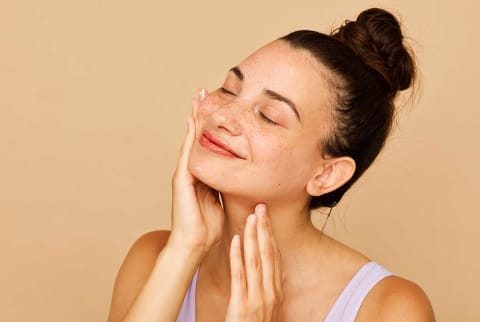
April 28, 2021 — 22:15 PM
Whether your signature sneeze is high-pitched and delicate or a big, braying honk, we all do it. But what is sneezing, actually? “A sneeze is your body’s smart (and dramatic) way of dislodging germs, dust, animal dander, irritants, or pollutants lodged in your nasal lining,” says Sarah Villafranco, M.D. “Mostly, it’s a sign that your body is doing its job to get rid of allergens or irritants.”
In other words, sneezing is harmless. Still, in this time of COVID-19, “sneezing has become less of a feel-good thing in public spaces, sending nearby people scattering almost as fast as your 40,000 sneeze particles,” says Villafranco. So if you’re looking for tricks to keep sneezing to a minimum, we’ve pinpointed the most common causes and rounded up the best home remedies.
10 things that make you sneeze.
There’s a lengthy list of sneeze triggers, and different remedies are intended to address different causes. Here’s the quick-and-dirty rundown of the most likely suspects behind that achoo:
- Seasonal allergies
- Dust, dander, pollutants, and irritants
- Pollen
- Mold
- Perfume
- Synthetic fragrance
- Bright lights
- Spicy foods
- Infection
- Hereditary predisposition
11 ways to stop sneezing.
Keep in mind that sneezing isn’t a bad thing, and at one time, it indicated a robust constitution. “Ancient Greeks and Romans saw sneezing as a sign of good health and would respond to sneezes with the phrase ‘May Jupiter bless you,'” says Villafranco.
In rare cases, excessive and repetitive sneezing can be a clue of something more serious, “like chronic occupational exposure to irritants or certain types of epilepsy.” If you’re worried about the amount of sneezing you’re doing, bring it up with your doctor. Otherwise, try these tips:
1. Treat seasonal allergies.
If your nonstop sneezing is accompanied by itchy eyes, an irritated nose, and/or watery eyes, it’s a good bet that you’re dealing with allergic sneezing. Luckily, “Sneezing due to allergies is very treatable,” says Benjamin C. Tweel, M.D., an ENT at Mount Sinai Hospital. He says avoiding triggers is best, though it’s not always easy (or possible) to avoid pollen, dust, mold, grasses, or other common environmental allergens. In that case, “second-generation oral antihistamines are generally very effective for allergic symptoms, including sneezing.” Tweel also suggests topical antihistamines like nasal sprays or even allergy shots.
2. Learn (and avoid) your triggers.
Pay attention to your surroundings next time you sneeze, and see if you can identify a trigger. Are you walking past the perfume counter, eating something spicy, or stepping outside into bright natural light? Are you petting a dog or cat or changing your bed linens? By pinpointing the cause, you can take steps to minimize exposure.
Some people have a genetic predisposition to sneezing in response to sudden exposure to bright light, also known as ACHOO syndrome (Autosomal-dominant Compelling Helio-Ophthalmic Outburst syndrome)—yes, that’s a real thing. While experts don’t fully understand the cause of this condition, it may have to do with an overstimulation of the visual cortex in the brain, which can activate the secondary somatosensory cortex and trigger a sneeze.
An easy workaround? Slip on a brimmed hat or some polarized shades before stepping outside—a good tip for protecting your eye health, too.
Humidifiers are particularly helpful if your sneezes are allergy-related. Increasing humidity at home can help reduce allergy symptoms, including sneezing. Just make sure you’re maintaining appropriate humidity levels.
Foot reflexology can help relieve stress, which may minimize the severity of your allergy symptoms. Try pressing and holding the balls of the toes with your thumb or index finger for five seconds.
Vitamin C is an antihistamine and an antioxidant, and there’s evidence that it can support the immune system. Theoretically, getting a little more vitamin C in your diet by way of more citrus fruits and vegetables could help minimize sneezing.
7. Try the old cartoon trick.
Sneezing is one of our semi-autonomous reflexes, which means we have some level of control over it. Still, “don’t try to block a sneeze,” cautions Tweel. Pinching together your nostrils to stop a sneeze in its tracks can create a buildup of very high pressure in the nasal cavity. Tweel says there have been reports of this buildup leading to aortic dissection, hearing loss, blood clots around the brain, pneumocephalus, bleeding in the retina, and rib fractures.
Fortunately, “There is one great way to suppress the sneezing reflex if you feel it coming on,” he says. It’s the old “finger under the nose” trick from cartoons—try applying pressure to the columella, the divider between the nostrils—by pressing in an up-and-back direction with a horizontal index finger.
Collective wisdom holds that saying a funny word when you feel that ominous tickle is enough of a distraction to thwart the sneeze before it starts. There’s no scientific evidence that it works, but hey, it’s worth trying.
This is another common-sense remedy. Since we sneeze to expel irritants from the nose, blowing your nose as needed could help keep those achoos in check.
These funny little teapot-looking things are designed to flush the nasal passages with a gentle saline solution. “Nasal irrigations such as sinus rinses or neti pots can be helpful in clearing out mucus or allergic particles that may be in the nose,” says Tweel. Try using a neti pot once or twice a day to flush nasal irritants and help keep sneezing at bay.
If you’re feeling especially sneezy, take a break from fragrance—both synthetic and natural. Scented lotions, perfumes, soaps, candles, diffusers, and even laundry detergents can trigger allergy symptoms.
The occasional sneeze is really no big deal (and may Jupiter bless you). But if sneezing is bothering you, pay attention to potential triggers so you can give one of the most appropriate home remedies listed here a shot.








